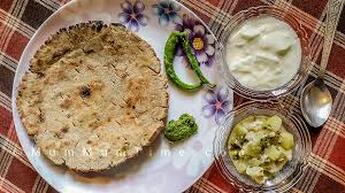|
Fasting, Vrata (व्रत) & Upvas (उपवास)
Fasting is integral part of Hinduism which not only provides freshness to life but also fuel spiritual & religious development. All the religions of the world have adopted the practice of fasting in some form. But in Hinduism, fasting is always associated with other actions to purify body and bring calmness to mind so essential for spiritual upliftment. These actions are Upvas and Vrata which do not have equivalent words in English language. While fasting is more related to intake of food & drink, Upvas and Vrata are having more of spiritual connotation. The purpose of Upvas is to imbibe the virtues of God. Vrata is a commitment, spiritual practice, or mental discipline. Vratas give the strength to withstand the temptations of the instinctive forces. Fasting, Upvas and Vrata together purify the body, mind and soul. Fasting Abstinence or reduction of all or some food items for definite or indefinite period is called fasting. In Hinduism, fasting is associated with certain dates such as Ekadasi, Pradosha, or Purnima; days such as Monday for Shivji, Tuesday for Hanuman ji in north, Ganesh ji in Maharashtra, Mariamman in south, Thursday for Brihspati or Guru, Friday for Goddess, Saturday for Hanuman ji in Maharashtra; festivals (Maha shivratri, Navratri, Janamashtami, Karwa Chauth, etc.)
3. Benefits: The ancient Indian medical system of Ayurveda sees the basic cause of many diseases as the accumulation of toxic materials. Regular cleansing of toxic material keeps us healthy. Fasting overhauls the respiratory, circulatory, digestive and urinary system. In moderate fasting, the organs of the body are cleansed and renewed. As per research report published in Medical News Today on 7.11.2018, the benefits of intermittent fasting (an eating cycle that includes periods of fasting of around 12–36 hours) based on research are as under:
Vrata (व्रत – Sacred Vow, संकल्प – Resolve) Vrata has two words in Sanskrit, “Vr” means discipline and “rta” means regularity. In Vrata, the person makes self-commitment to abstain to do certain acts or make vows for spiritual practice. It is basically self-sacrifice or mental discipline. Vrata is a binding force, binding the external mind to the soul and the soul to the Divine. Taking a vow is a sacred trust between yourself, your outer self, your inner self, and your loved ones. A religious vrata is a contract between yourself, the religious community, the Gods and your guru. References to the vratas are found in the Samhitas, Brahmanas and Aranyakas of all the four Vedas. In Vedas, Rudra is mentioned as the lord of Vratas (Vratapati). While performing vratas, one must abide by several rules such as one should keep oneself clean and pure, observe celibacy, speak the truth, practice forbearance, avoid non-vegetarian foods and scrupulously perform all the rituals connected with it. Vratas prepare the person for self-transformation and realization. Types of Vratas Vratas can be classified according to level at which it is observed i.e. at body levels (kayakia Vratas), at mental level (manas vratas) and at speech level (vachika vratas). Further, it can be classified according to period of its observance, the purpose of its observance or the deities for which it is kept. At speech level, the Vrata is Maun Vrata i.e. to keep silence for certain period. This purifies speech, brings no harmful effect on other persons, conserves energy and helps the person to introspect peacefully. Maun Vrata is active silence to bring positive change, in contrast to stop speaking out of anger. Benefits of Vratas Vratas develop confidence and discipline in life. Vratas give the strength to withstand the temptations of the instinctive forces. However, sometimes failing in the vrata is possible; but striving to fulfil it has the strengthening effect. Importance of Vrata finds mention in Bhagwat Gita and Yajurveda as under:
Popular Personalities in Hinduism who took Vrata In Mahabharata, Bhishma took Vrata to remain lifelong Brahmacharya. His vow is popular by name as Bhishma Pratignya. Bhagiratha took Vrata to bring Ganga to earth. For which, he did penance for thousands of years. Chanakya had taken Vrata to replace dhananandha & to keep an worthy successor for the throne of maghada. Mahatma Gandhi took 11 vows viz. non-violence, truthfulness, non-stealing, Brahmacharya, non-possession, physical labor, control of the palate, fearlessness, equality of all religions, use locally made goods and to remove untouchability. Upvas (उपवास) Upvas (उपवास) has not the same meaning as fasting. Upvas has two words in Sanskrit, “Upa” means near and “vas” means sitting. During Upvas, the person, observes chastity, solitude, silence, and do self-introspection. Upvas is just not fasting. On that day, the persons choose to be near their favorite deity, control on all the senses is exercised, withdraw from regular activities, go to the temple, or find a secluded place for their devotion. Varah Upanishad has explained that the purpose of Upvas is to be near to God, to worship God, to imbibe the virtues of God in life. It is not the name of torturing the body. (उप समीपे यो वासो जीवात्मपरमात्मयोः। उपवासः स विज्ञेयो न तु कायस्य शोषणम्।। - वराहोपनिषद् 2/39)
2 Comments
|
Archives
July 2024
Categories |

 RSS Feed
RSS Feed